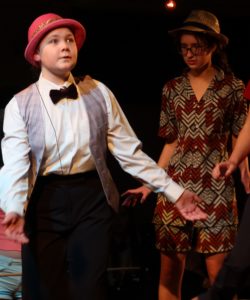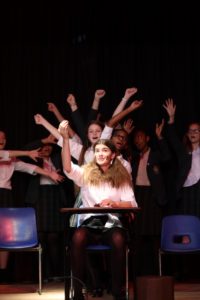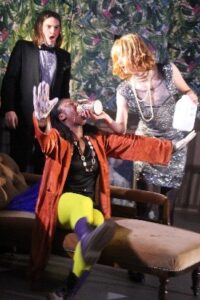Curriculum Intent
Drama at Southend High School for Girls, aims to be an engaging, stimulating, inspiring and challenging course that allows for every student to build the confidence to compete for world leading opportunities in the field of performance and beyond. Participating in drama will challenge students’ perceptions of the world around them and provide a safe place to express thoughts and feelings that they might not otherwise have a means to express, in turn allowing them to become confident in taking risks and opening the possibility to lead remarkable lives.
In practical terms, drama promotes involvement in, and enjoyment of drama, as performers, directors and designers. Students explore different forms and styles of performance; engage in methods and processes such as devising techniques, improvisation and textual study; develop presentational and communication skills and acquire technical skills in areas such as lighting and costume design. Additionally, drama provides opportunities to develop skills as informed and thoughtful audience members.
To this end, we want students to have access to creative teaching, expert practitioners and inspiring productions, where students’ innate creativity is fostered and innovation is encouraged. An enhanced curriculum provides students with further opportunities to participate in a range of production, technical and performance roles or to develop complimentary skills such as playwrighting.
A life enhancing subject.
Skills learnt in drama can serve students well in all aspects of life, from developing a positive and confident self-image, to acquiring self-control and discipline, and taking ethical approaches to their work. The collaborative nature of drama allows students to learn to work together, to listen to and accept the viewpoints and contributions of others. Above all, drama allows students to put themselves into others’ shoes and relate to them; it is therefore an important tool for preparing students to live and work in the world with tolerance and empathy. Seeing the world through others’ eyes and really understanding others’ motives and choices is critical in helping to build responsible citizens.
What does it feel like to be a student in the Drama Department?
Studying drama at Southend High School for Girls means engaging in an exciting, inspiring and challenging course where you become the maker of art. You will enjoy and become involved in drama as performer, director and designer. In lessons, you will explore different forms and styles of performance; engage in methods and processes such as improvisation, devising techniques and textual study; develop presentational and communication skills alongside practical skills of voice and movement; acquire technical skills in areas such as lighting and costume design. You will be challenged to work collaboratively, as well as independently, to create original work and to interpret texts from a range of writers, cultures and times. Each year the department arranges workshops with influential theatre companies such as The Paper Birds and Trestle Theatre, as well as independent practitioners. You will spend some considerable time watching performances. Through these viewings you will develop a working understanding of contemporary theatre practice, bringing what you see and experience into your own creations. Alongside this, you will develop your ability to analyse how meaning is made in theatre, to become an informed and thoughtful audience member.
As a drama student at SHSG, you will be encouraged to create work that is bold, brave and innovative, in a supportive and creative environment. You will frequently review and reflect on your work, seeking feedback from audiences. You will have opportunities to participate in super-curricular performance events in a range of production, technical and performance roles or to develop complimentary skills such as playwrighting or participate in national competitions and LAMDA examinations. Our students have won prestigious awards for their work with New Views, and Poetry by Heart, and we currently have several students (and past students) who are members of both the National Youth Theatre (NYT) and the National Youth Music Theatre.
In recent years SHSG drama students have progressed to distinguished conservatoires; Central School of Speech and Drama, Trinity Laban, East 15, Rose Bruford, Arts Educational, Urdang Academy. Others have gone on to study the subject at universities with renowned drama departments: Exeter, Queen Mary’s University of London, King’s College London and Royal Holloway. However, the value that the study of drama brings to any university course or career is recognised by top universities and employers alike. Qualities of empathy, discipline, collaboration, and creativity, together with the confidence, presence and communication skills acquired – all combine to provide an advantage for students on any course or career pathway, or simply for navigating life itself.
In conclusion, drama will support you to develop a positive and confident self-image and provide a safe place to express thoughts and feelings that you might not otherwise have a means to express. Drama will also provide opportunity for you to become more persuasive in your communications – be that through speaking or writing. Drama allows you to work closely with others. But perhaps above all, drama will challenge your perceptions of the world around you. Throughout its long history of thousands of years, drama has always provided a political and social space where makers of drama put themselves into others’ shoes, relating to their stories with empathy and understanding.
Please click on the button below to download the assessment policy for Drama.





